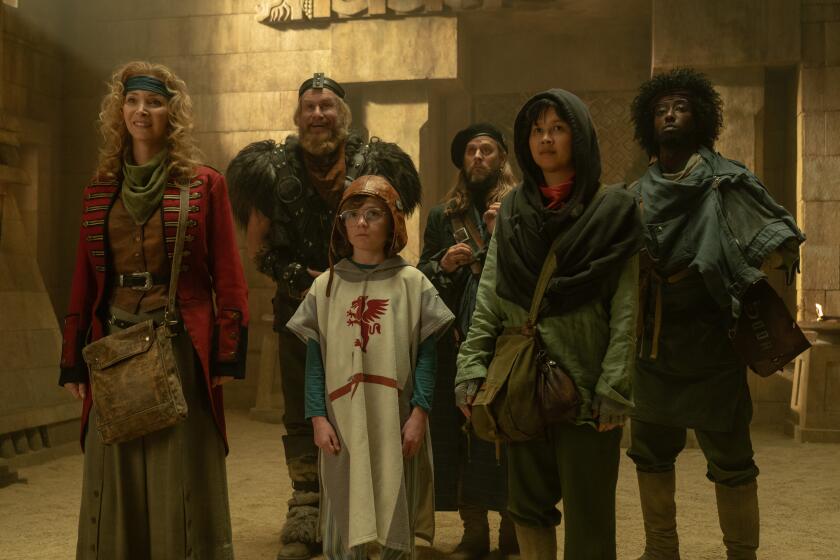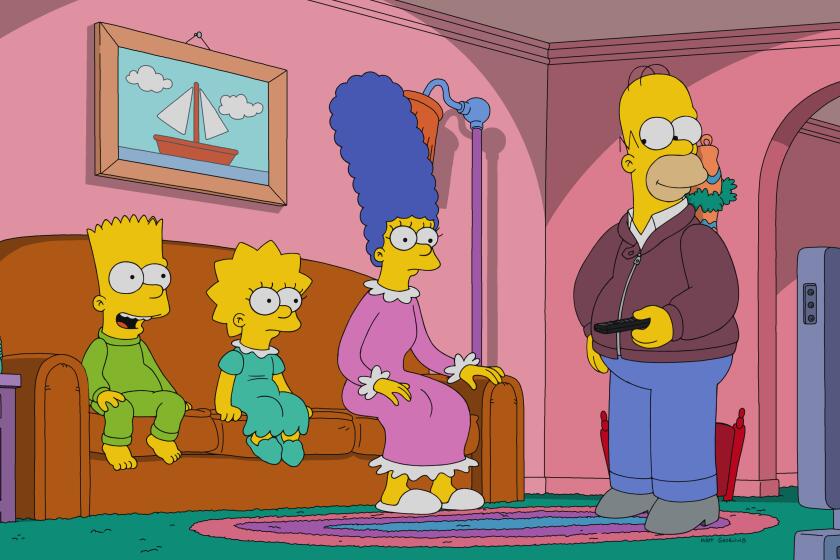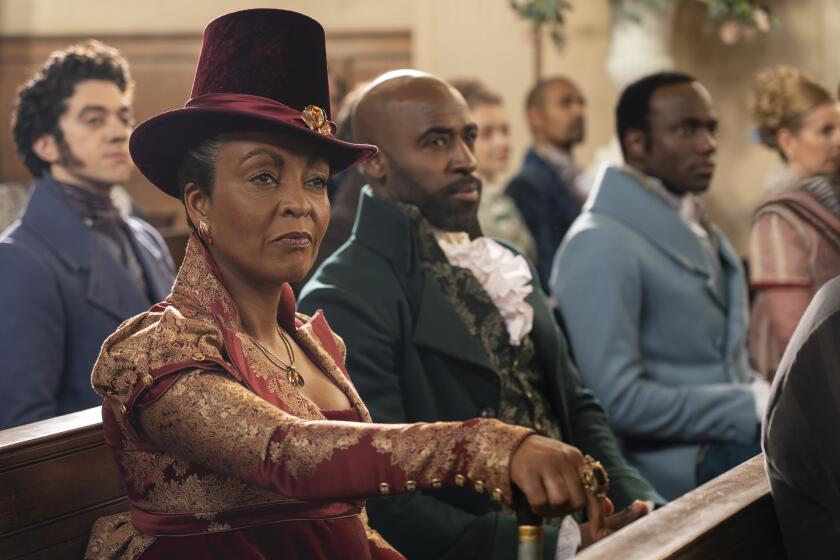JOHN CANDY’S READY TO TAKE CONTROL : My agent is always telling me--’it’s not called show art, it’s show business.’ And I have to learn that . . .
Eighteen months ago, if you had asked people in Hollywood to pick a hot new comedy star, you would always have spotted John Candy’s name near the top of the list.
In addition to the gallery of outrageous characters he’d brought to life on “SCTV,” the Toronto native had won raves for his supporting roles in such big-screen comedies as “Stripes,” “National Lampoon’s Vacation” and “Splash.”
Last summer Candy got his stardom shot with top roles in “Volunteers” and “Summer Rental,” plus a major supporting role in “Brewster’s Millions.” All three films were disappointments. And his latest, “Armed and Dangerous,” which features Candy and old “SCTV” cohort Eugene Levy, opened recently to poor reviews and a modest reception at the box office.
What went wrong? Although Candy has kind words for the film makers he’s worked with on his recent pictures, he maintains that he’s “frustrated” by his lack of control over his film projects. “The big difference is that with ‘SCTV,’ we had complete control over what we were doing,” he explained in his new office here. “We may have felt that the show was often on in a really late time slot, but at least we had the responsibility for all of our work, from the sketches down to the scenery.
“The problem with film is that you can’t see it through to the end. You can’t get your hands on the material. A lot of times, the project you saw at the beginning has completely changed by the time you see it on screen.”
Candy’s current film is an apt example.:
“Armed and Dangerous” has been bouncing around Hollywood so long you can almost see studio executives brushing off the cobwebs--it was originally intended as a vehicle for John Belushi and Dan Aykroyd.
Many critics spotted this cut ‘n’ paste approach right away.
The Times’ Michael Wilmington dubbed the picture “an almost foolproof misfire. It plays like a third-generation dupe print of ‘Police Academy.’ ”
“It’s been around for five or six years and there’s probably been about 15 versions of the script,” explained Candy, comfortably dressed in beige slacks, a striped tie and a sports jacket. “It had Belushi and Aykroyd at one point, then Harold Ramis (who co-wrote the script) and Dan, then Dan and I, with John Carpenter slated to direct.
“When they dropped out, I was left with a contract and no movie. So Gene (Eugene Levy) came in, took my role and I took Dan’s spot.”
The film ended up being directed by Mark Lester, best known for his work on action films like “Commando.” “To be honest, the film went through a lot of directors and no one was really that interested,” Candy said. “But Mark had a lot of good ideas and I think he did an admirable job.”
A shy, genial man with a warm, spontaneous wit, Candy appeared at ease giving a rare interview, relaxing on a couch in his Brentwood office, sipping a diet soft drink and smoking cigarettes. An adept storyteller, he grew especially animated reminiscing about his days in Second City and discussing the fortunes of his Toronto Blue Jays.
Still, he admits to being a bit mystified by the labyrinthine process known as script development. “I’m always hearing about these great scripts, but then they say, ‘Oh, it needs a rewrite.’ And then before you know it, there’s another rewrite, and then it needs a little polish, and by the time it’s done, it’s almost unrecognizable.”
Candy grinned. “I mean, can you just imagine the poor guys who came up with the original idea when they go to the movie with their family and they say, ‘Hey, wait a minute. I didn’t write that! Who’s that character?’ And of course if the movie bombs, then everyone dumps on those guys!”
As a Second City veteran, he seems far more comfortable with the immediacy and daring of improvisation, where the gauge of good comedy is the laughter of a live audience. Candy and Levy came up with a bit in “Armed and Dangerous” where they hide in a porn shop, Candy outfitted in Divine-style drag, Levy in a cycle jacket and leather pants exposing his buttocks.
“Mark (Lester) and I just broke up laughing when we saw Gene, but he said there was no way he was going to wear those pants,” Candy recalled. “We just kept laughing and laughing, so Gene finally grumbled, ‘OK. I’ll do the leather, but not the cut-outs!’ ”
Seeing Candy and Levy together on screen is like watching the smooth ballet of a baseball double-play combination who’ve been together since the minor leagues. The two comics met nearly 15 years ago in Toronto, when Gilda Radner got Candy tickets to see Levy in a Toronto production of “Godspell.” The friendship continued when the two began working together a few years later in the Toronto company of Second City.
For Candy, who’d grown up in Toronto, getting into Saturday-afternoon matinees with money he’d earned collecting bottle caps, joining the much-heralded Chicago Second City troupe in 1972 was “the best thing that ever happened to me.”
He still can recite entire sketches he performed more than a decade ago. “I’ll never forget when I first went down to Chicago, how in awe I was. The company I joined had Bill Murray, Betty Thomas, Jim Stahl and Ann Ryerson. I remember watching them perform one night and I thought, ‘I’ll never be able to fit in. I can never do this.’ ”
Candy laughed. “Then (Second City director) Del Close leaned over to me as I was watching and said, ‘You’ll be doing this Wednesday night.’
“I was so nervous that on my first night, while the stage was dark in between sketches, I ran smack into one of the guys and hit him so hard I split my lip. And I had to introduce the next sketch--our VD sketch--and blood was running down the side of my mouth as I talked and everyone started laughing. I guess they just thought it was all part of the act.”
After Second City came a long, critically acclaimed run on “SCTV,” an inspired, late-night video fun house. It’s perhaps symbolic of how much the show meant to Candy that while his movie posters were still propped up against a wall in his new office, his “SCTV” awards were already framed and hanging along the stairs.
He said the troupe is scheduled to reunite for a series of CBS-TV specials next year, and there’s also talk of a possible “SCTV” feature film. “The drums are still beating,” he said. “We talk all the time. I think the basic attitude we started with--that it’s us against the world--still holds true. So we’d like to give a film a shot.”
Candy has also decided to open up more to the press. Until this current film, he’s refused virtually all interview requests, even when he had two major films in release last summer.
“I think the real reason I hate to do interviews is because I think I’m boring,” he said. “I just always thought there were more important things to talk about than myself.”
He fumbled for a cigarette. “Also I get nervous. When I did a few interviews several years ago, there were a few things said about me that I was uncomfortable with. I felt I’d put my foot in my mouth. So it’s an awkward situation.
“That’s why I hate doing TV. Because then people can actually see how nervous I am. I did something with ‘Night Watch’ the other day, only because I figured that it was on so late that no one would ever see it.”
After the success of “Splash,” Candy had a development deal at Disney Studios, but he said that after a change in the studio’s administration, none of the projects got off the ground.
“I’ve become more and more aware that I need to write and develop my own work,” he said. “For a long time I was on a good roll, going from picture to picture, and I just couldn’t carve out the time. Now I’m pushing myself harder to take control. I don’t know if I can do it or not, but I’d like the opportunity to try.”
One possible project that’s captured his imagination is a script written by director John Hughes. “I know you’re not supposed to talk about these things until they really happen, but it’s really what I’ve been waiting for. I just cried with laughter when I read it. It’s like it was written for me, which makes a big difference. You could just see the movie in your mind.”
The way Candy sees it, the way to win in Hollywood is to stubbornly show the studio powers that you can do good work. “You try not to make it a situation of ‘them versus us,’ ” he said. “But I’ve always had a little rebel in me and I’ve always battled with authority. That was the great part of Second City--we were all rebels, so were in it together.”
He shrugged. “My agent is always telling me--’it’s not called show art , it’s show business .’ And I have to learn that part of it. Until the money comes out of your pockets, you can rant and rave all you want, but they hold the purse strings.”
The complete guide to home viewing
Get Screen Gab for everything about the TV shows and streaming movies everyone’s talking about.
You may occasionally receive promotional content from the Los Angeles Times.



